David Suzuki's Blog, page 56
September 10, 2015
The most important election issue that nobody is talking about

(Credit: Kim via Flickr)
One of the most critical issues flying under the radar in this election is public transportation. Although it isn't getting the attention it deserves, all major political parties have pledged new federal investments in transit infrastructure, if they are elected:
The Conservative Party announced a new Public Transit Fund in Budget 2015. The new fund would start in 2017 with an initial investment of $250 million and then ramp up to $500 million in 2018 and $1 billion annually thereafter.
Addressing the Federation of Canadian Municipalities in July, Opposition leader Tom Mulcair pledged that an NDP government would invest $1.3 billion annually over the next 20 years as part of a Better Transit Plan.
The Liberal platform includes a commitment to increasing transit investments by nearly $6 billion over the next four years (triple current levels), and almost $20 billion over ten years (quadruple current levels).
The Green Party platform pledges $764 million in annual support to VIA Rail by 2020. They're also proposing support to provinces and municipalities regarding their public transportation plans, without indicating a set figure for financial contributions.
Significant and timely investment is crucial to build and maintain transit infrastructure in Canadian cities, but we also need ambitious, new ideas to improve the ways we move around. In general, we haven't heard much in the way of creative transit solutions so far.
Giving people transportation options beyond cars is vital for a whole range of reasons, not least because emissions from this sector contribute so significantly to climate change. In Ontario, transportation is the biggest source of greenhouse gases, dumping over 60 million tonnes of carbon dioxide into the atmosphere in 2013 alone. Automobile traffic also costs us time and money. Canadian commuters spend an average of 32 working days a year -- more than a whole month! -- travelling to and from work. Congestion in the Toronto area alone costs $11 billion annually.
So what should the parties be doing? Why not suggest, for example, that our cities take the simple approach of making high-traffic areas more walkable, as was done in New York's Times Square? The Times Square transformation, which was championed by business, created a walk-able, car-free area which is credited with cutting traffic-related injuries.
Some parties propose that electric vehicle charging stations would be a good thing -- that's true -- but it's not clear they have plans to ensure that electricity is drawn from renewable sources. California, by comparison, is committed to getting 50 per cent of its power from renewables by 2030 -- half of their electricity will come from things like wind, water and solar in just 15 years!
Expansive thinking doesn't have to be expensive. In the last few weeks, I've talked to a number of transit experts and one thing they stress is the need to give greater attention to cycling. Getting more people on bicycles would reduce emissions and congestion, save money and improve Canadians' fitness. And it wouldn't be hard to implement. Transit expert Albert Koehl says we could facilitate bike riding simply by lowering speed limits: when cars go slower, cyclists feel safer. Such a move wouldn't take a lot of dollars, just the federal government's willingness to put some pressure on municipalities. But cycling gets almost no mention in the main parties' platforms.
There's also near silence on the idea of moving more freight by train and less by truck. Environmentalists embrace this because, as the Pembina Institute points out, trucks contribute 12 times more GHG emissions than trains. Car drivers would certainly benefit from the removal of monster vehicles that threaten their safety, but somehow mainline politicians don't see the appeal.
In 2011, a total of 2,006 Canadians were killed in car accidents. Today, 10 million Canadians live within 500 meters of a highway or major road and face elevated health risks from exposure to traffic pollution. Over the past 10 years, terrorists have killed two people in this country. If candidates in this election want to take the safety of Canadians seriously, they need to pay more attention to the numbers.
Hey! Want more DSF? Join David Suzuki on Facebook

Vote for a better, cleaner Canada
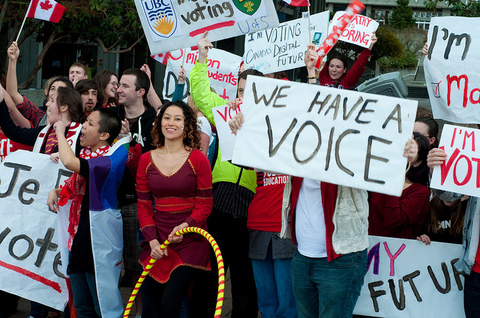
(Credit: Adam Nowek via Flickr)
No matter what anyone says during this long federal election campaign, climate change is the biggest threat to Canadians' health, security and economy. The scientific evidence is incontrovertible, the research wide-ranging and overwhelming.
Wastefully burning fossil fuels at such a rapid rate is jeopardizing the planet's life-support systems -- harming human health, destroying landscapes and habitat, causing widespread extreme weather events and contributing less to the economy and job-creation than clean energy development. Not only that, our rate of using and exporting these fuels means reserves will be depleted before long. In the meantime, as easily accessible sources run out, fossil fuels have become more difficult, dangerous, expensive and environmentally damaging to exploit.
Canada has a long history of extracting and exporting raw resources to fuel its economy. But that's no longer a sensible long-term plan, especially with non-renewable resources. It's incomprehensible that a country with such a diverse, educated, innovative and caring population can't get beyond this outdated way of doing things. The recent oil price plunge illustrates the folly of putting all our eggs in one fossil fuel basket.
As world leaders prepare for the December UN climate summit in Paris, we need our government to play a responsible, constructive role. Canada has been chastised at previous summits for obstructing progress and working to water down agreements. The summit's goal is for all the world's countries to reach a legally binding pact on climate change and greenhouse gas emissions to keep global average temperatures from rising more than 2 C, the threshold beyond which experts and world leaders agree could bring catastrophic consequences.
The consequences are already severe and will get worse if we don't act. Increasing extreme weather, including heat waves, floods, droughts and storms put lives, agriculture and economies at risk. Subsequent conflicts over resources reduce global security and exacerbate refugee problems. Pollution from burning fossil fuels increases heart disease and respiratory illnesses, including asthma. Deep-sea drilling, oil sands mining and mountaintop removal destroy the ecosystems, habitat, wildlife and natural capital on which our health and survival depend.
Everyone seeking election must get serious about the climate, so no matter which party or parties form government after October 19, Canada will be part of the solution.
Continuing with business as usual will only ensure more extreme weather leading to floods and droughts; negative health impacts, including increases in premature deaths; harm to food production and security; more pipeline, rail and marine accidents; and missed opportunities to diversify the economy.
Although climate change, resource development and infrastructure have been raised in this election, the talking points don't always match the severity of the problem. It's up to all of us as voters to question candidates and inform ourselves about the various party platforms before casting ballots -- and to make sure all the parties and their candidates listen and make climate change a priority.
Canada is a great country, an example to the world of how people with diverse views, backgrounds and cultures can live well together and take care of each other. We are blessed with spectacular nature, abundant clean water, fertile agricultural land, rich resources, an educated populace, vibrant democratic traditions and strong social programs. But we can't take any of it for granted. We must protect what we have and strive to be better, to move beyond our outdated ways of thinking and acting.
There are numerous election issues that can't be ignored, including health, child care, jobs and the economy, infrastructure, education, international trade and relations, and our global responsibility to confront terrorism. Addressing climate change by shifting from the short-term prospects of the polluting fossil fuel economy to a more stable, healthy, green economy would go a long way to reducing health-care costs, creating jobs, diversifying the economy and improving our international reputation.
YES, I'm voting on October 19.
We have an important choice, as voters and as a country. We can heed the scientists, health-care specialists, religious leaders, politicians, international organizations, business people and citizens around the world who say we no longer have time to lose when it comes to protecting the climate and ourselves. Or we can carry on as if nothing is wrong, and live with the mounting consequences.
Exercising your democratic right as a voter is a critical step.
Hey! Want more DSF? Join David Suzuki on Facebook

Will "butterflyways" save the monarch butterfly?
Research has begun along Ontario rail, hydro and municipal corridors
TORONTO -- This week the David Suzuki Foundation launched an ambitious multi-year research project with University of Guelph researchers Tyler Flockhart and Ryan Norris that is expected to provide a roadmap for international efforts to bring back migratory monarch butterfly populations. Flockhart was recently awarded a prestigious Libre Ero Fellowship that allows him to continue his leading research into population dynamics of monarch butterflies.
"Linear infrastructure corridors are the landscape of greatest opportunity for monarch butterfly conservation across North America," said Flockhart, University of Guelph Conservation Biologist. "For the next two years we'll be working to find the most ecological and cost-effective methods to restore monarch habitat-- providing scientifically-based guidance for the growing movement to recover dwindling pollinators through habitat restoration. We hope to engage citizen scientists as well."
Initial research will be conducted along three corridors in southern Ontario, including the Uxbridge Subdivision on Metrolinx's Stouffville GO Train corridor; lands adjacent to a Hydro One Transformer Station in Vaughan; and a habitat restoration site within the Milne Dam Conservation Park in the City of Markham.
"We're excited that progressive agencies like Metrolinx, Hydro One, and the City of Markham have joined the growing, continent-wide effort to help monarch butterflies," said Rachel Plotkin, David Suzuki Foundation policy manager. "Our hope is that findings from these initial studies will help spur thousands of kilometres of "butterflyways" along the monarch's migratory pathways."
The eastern monarch population has dropped by more than 95 per cent since the 1990s, largely due to the dramatic loss of an estimated 67 million hectares of milkweed plants and monarch habitat -- comparable in area to Alberta -- along the migratory path from Mexico to southern Canada. The milkweed loss was caused largely by widespread use of the controversial herbicide glyphosate. This has led scientists to speculate that the monarch migration -- one of the most awe-inspiring insect journeys on the planet -- might come to an end.
This spring, U.S. federal and state agencies made encouraging announcements, including a commitment of US$3.2 million for programs to grow milkweed in schoolyards and gardens and on highway roadsides from Mexico to Minnesota. The U.S. plans to plant millions of milkweed.
In Toronto, the David Suzuki Foundation has spurred planting of more than 15,000 milkweed and pollinator-friendly plants through its annual Got Milkweed campaigns over the past two years. However, the scale of response needed to ensure the continuation of the monarch migration is greater than these local efforts, so the David Suzuki Foundation is keen to continue finding additional agencies and collaborators.
- 30 -
For more information, please contact: Jode Roberts at 647.456.9752 jroberts@davidsuzuki.org.
Hey! Want more DSF? Join David Suzuki on Facebook

September 9, 2015
Let's have some fun with the Globe Debate

(Credit: Dave Austria via Flickr)
The election debates are a good opportunity to learn about the positions and personalities of the party leaders running for Prime Minister. But they can also be boring. Sometimes they only get watched by political keeners and not the most important demographics -- undecided voters or those who many not vote!
So, have some fun -- host your own jelly bean debate party on September 17! You'll be able to join in on social media, declare a winner and get your friends to register to vote. (If you're watching on your own, you can just follow along with us -- still fun!)
Here's how to host your own jelly bean debate party:
Invite friends, family, co-workers and neighbours. Consider including a few that aren't political and who may not be planning on voting.
Label three jars with the leaders' names and parties -- one jar for each leader.
Put out a bowl of jelly beans. Every time one of the leaders says something someone agrees with, a jellybean goes into in that leader's jar. At the debate's end, you'll be able to count the jelly beans and declare a winner! The jelly bean jars will also make good pictures for social media (use #DSF and #Globedebate). Make sure to mention that you're keeping score with jelly beans!
When the leaders say something you disagree with, follow your own rules! Maybe take a sip of your drink whenever you hear something you don't like, throw a marshmallow at the screen (you're the host, so you know if your screen is tough enough to withstand a marshmallow blow!) or send a disapproving tweet using #Globedebate and #DSF.
Have a computer or iPad ready and ask your party participants to sign our voters' pledge.
Make sure they're all registered to vote -- it should only take a couple of minutes each. NOTE: Registration rules have changed and voter cards (with I.D. that includes a matching address) are more necessary than previous years.
Here's how to play along on social media:
Post pictures of your labelled jars with a statement that says something like "We scored points with jelly beans. This is who we think won the #GlobeDebate." Include #DSF so we can see your results.
Follow along and retweet the David Suzuki Foundation's reality checks tweets. Our top policy analysts will be ready to help make sure what you're hearing is correct and to provide some interesting content and perspective.
Where to watch the debate on Thursday, September 17, 8 - 10 PM (EST):
Viewers can livestream the debate on globeandmail.com.
CPAC TV will live broadcast the debate in French and English.
Help influence the debate before it starts:
Email the debate moderator and ask him to include the questions below in the debate.
Tweet one or more of the questions below using #GlobeDebate.
Share this graphic on Facebook using #GlobeDebate.
Here are some questions to suggest:
With the fall of oil prices and rapid growth in renewable technology, how will you encourage a transition to a clean tech economy? Click to tweet
Canadians subsidize the fossil fuel industry to the tune of $1.3 billion per year even though the industry is in a downturn, which has destabilized our economy. How would you promote a diversified, more stable economy? Click to tweet
Provinces that have put a price on carbon have seen economic growth that outpaces the Canadian average. How will you encourage a national carbon-pricing policy that benefits all Canadians? Click to tweet
If you have any questions, email us at election2015@davidsuzuki.org.
Don't forget to make sure you are registered to vote.
As voters, we have the power to make a difference in this critical conversation. Let's exercise it.
YES, I'm voting on October 19.
Hey! Want more DSF? Join David Suzuki on Facebook

Environmental issues should be front and centre in the Globe Debate on the economy
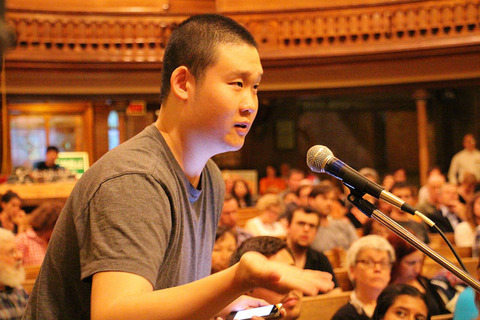
(Credit: Joe Cressy via Flickr)
Imagine if Canada was a leader in renewable energy development and clean technology jobs, with a diversified economy that allowed us to live within nature's limits -- a smart economy that would take us into the future, built on the understanding that only a healthy environment can create a healthy economy. (The two are integrated, not opposed!) What if our economy grew by creating jobs in sectors -- such as clean technology -- in industries which support our environmental goals as we transition away from our reliance on the destabilizing fossil fuel and extractive economy.
Canadians want a balance that protects the environment and the economy, but so far election coverage has been short on details of how to get there. We want that to change. For the past couple of weeks, the David Suzuki Foundation has been encouraging Canadians to get in touch with the Globe and Mail and urge them to ask tough questions of the federal party leaders during their September 17 economic debate, questions like
Do candidates support ending fossil fuel subsidies?
How will they transition to a clean-tech economy?
Do they favour a national carbon-pricing policy?
Do they support our country joining 110 nations that recognize the right to live in a healthy environment by amending Canada's Constitution?
These topics shouldn't be seen as separate from our economy. In Canada, extreme weather events like Vancouver's summer drought and flooding in Calgary and Toronto show how vulnerable our communities are. Canadian insurers paid out a record $3.2 billion in claims due to extreme weather events in 2013 and are increasing premiums, taking money out of the pockets of families that could have been spent in local economies.
As the severity of climate change intensifies, the cost of imported food rises and energy bills increase. Extreme weather events affect travel. Droughts and floods put increased pressure on local food production and prices -- yet another hit to our economy.
The good news: Solutions to the climate crisis are a huge economic opportunity
To help make sure these issues and many more are front and centre in the Globe Debate about the economy, we'll be live tweeting the debate. Our top policy analysts will help make sure what you're hearing is correct and provide interesting content and perspective. Learn more about how to follow along and have some fun at the same time by hosting your own debate party and following the conversation online.
Want to read more to get ready for the debate and engage in this election?
Find out how Canada would benefit from a national carbon price.
Find out why oceans should matter in this election.
Learn how to get involved in your local all candidates debate.
Don't sit on the sidelines! Sit on your couch and follow the debate with the rest of the David Suzuki Foundation community. Together, we can help shape the conversation and make sure Canadians understand that a healthy economy depends on a healthy environment.
YES, I'm voting on October 19.
Hey! Want more DSF? Join David Suzuki on Facebook

Dissecting the cuts to Canadian science
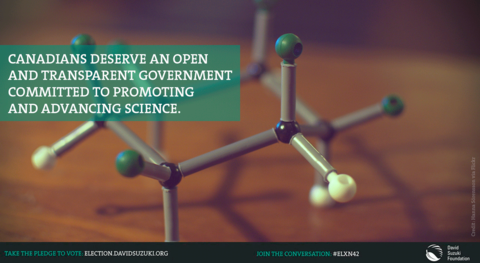
(Credit: Hanna Sörensson via Flickr)
For several years I've written open letters and articles about the important place science holds in our society, particularly with respect to public policy and culture.
The election period in which we now find ourselves is an opportune time to revisit the role of science in decision-making. Unfortunately, like many other critical issues, science has lost out almost entirely to a focus on the economy.
So, allow me to bring science back into the conversation.
How is science holding up in Canada?
Here's just a small sample of some federal government decisions that have affected our scientific capacity over the past several years:
The abolition of the National Round Table on the Environment and the Economy;
The abolition of Hazardous Materials Information Review Commission;
Ending funding for the Canadian Foundation for Climate and Atmospheric Sciences;
Programs such as the monitoring of contaminants and marine toxicology have been abolished, or seen their funding greatly reduced, as is the case for the research centre on oil, gas and other sources of offshore energy;
The closure of the Polar Environment Atmospheric Research Laboratory (PEARL) in Nunavut (later reopened);
Gutting of legislation that protected fish and endangered species;
Cutting the funding to the Experimental Lakes Area -- a one-of-a-kind natural laboratory that played a pioneering role on acid rain research. (Luckily, the ELA was saved by an agreement between Ontario and the International Institute for Sustainable Development.);
The closure of seven libraries run by Fisheries and Oceans Canada along with libraries run by Natural Resources Canada, Environment Canada and Health Canada;
Abolition of the mandatory long-form census from Statistics Canada;
The muzzling of government scientists.
Although this list is nowhere near exhaustive, it still paints a stark picture of how science, and everything that depends on good evidence, has been battered in recent years. According to a report from the Professional Institute of the Public Service of Canada, $596 million in science and technology budgets and the equivalent of more than 2,000 positions between 2008 and 2013 have been cut.
Clearly science funding was the "odd man out" in terms of federal government priorities in recent years. This fall's election campaign gives us an opportunity to reignite the conversation around the role of science in our democratic process.
This isn't about politicizing science, because it needs to remain neutral and objective, but instead ensuring that all our political leaders and all our political parties have the courage to restore science to its rightful place.
With the many critical challenges on the horizon including climate change, changing demographics, advancements in information and technology, and issues around our health and our economy, we must ensure science is well-funded and at the cornerstone of our decision-making.
As voters, we have the power to make a difference in this critical conversation. Let's exercise it.
YES, I'm voting on October 19.
Hey! Want more DSF? Join David Suzuki on Facebook

September 8, 2015
Three big issues for Election 2015: Atlantic, Pacific, Arctic
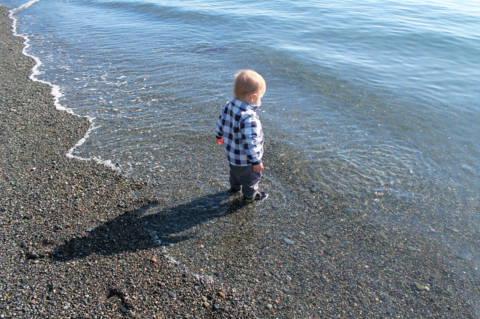
Credit: Kasey Eriksen via Flickr
Canada has the longest coastline of any country, yet ocean health rarely makes it into federal election debates. Considering the prosperity, food, recreation and cultural opportunities oceans provide, our leaders would be wise to start talking about the big issues they face.
Protecting oceans benefits all Canadians. The air we breathe and climate stability are inextricably linked to the health of our oceans. In B.C. alone, $13.5 billion is generated every year in GDP from ocean-based industries and more than 84,000 jobs are created.
While ocean protection has been slow, not all the news is bad. Management of salmon and other fisheries on the West Coast has improved, endangered species such as B.C.'s southern resident killer whales are being helped with recovery plans, effluent flowing into oceans from mills and mines has decreased and marine protected areas and national marine conservation areas like B.C.'s Gwaii Haanas and Nova Scotia's Gully have been established.
Yet Canada continues to fail to meet its own protection commitments. Only one per cent of Canada's marine areas are protected, not even close to the commitment made through the UN Convention on Biological Diversity to protect 10 per cent by 2020. Other countries, including the U.S. and Australia, have met and exceeded their targets. Canada, however, ranks dead last in marine protection among the countries with the largest ocean areas, behind Indonesia, Japan and China.
With climate change, acting on our ocean commitments is more important than ever. Communities must adapt as sea levels rise, oceans acidify and weather fluctuates. On the West Coast, businesses face shellfish die-offs while salmon are threatened by dry steams and warming water. Yet Canada's carbon emissions continue to increase, further threatening ocean health.
As a northern country, Canada is especially vulnerable to climate impacts, which are making their mark on land, sea and ice. Canada's Arctic has been warming four times faster than the rest of the planet. Ice covering the Arctic Ocean is disappearing during the summertime at record rates. By 2050, the top of the world is expected to be free of ice for an unprecedented 125 days a year. This loss of year-round ice cover creates darker patches of land and water that absorb sunlight, adding to the warming effect. Melting permafrost releases methane, which further warms the planet to dangerous levels.
There's only so much local communities can do. Canada could be a world leader in ocean conservation, but we need strong national leadership to get us there. Almost nothing galvanizes support in coastal communities like opposition to more and bigger tankers filled with oil destined for Asia. These communities know well the risks of oil spills to their health and livelihoods, and many have raised concerns with local candidates. They question whether an oil-based economy is worth the risk to the health of their communities.
Given the necessity to act boldly on climate change and the immense importance of oceans to Canadians, it's time we asked some tough questions of those who could be leading our country.
Here are some you can ask your federal candidates:
Canada falls behind many countries in efforts to protect its oceans. What would you do to ensure we meet our UN commitment to protect 10 per cent of our marine area by 2020?
Oceans provide enormous economic opportunity for Canada, yet as we confront the effects of climate change and escalating development pressure from industry, the health of our oceans is in peril. What would you do to keep our oceans healthy?
Would your government increase investment in ocean science to better understand the changes faced by coastal communities and guide decision-making about ocean conservation?
As voters, we have the power to make a difference in this critical conversation. Let's exercise it.
YES, I'm voting on October 19.
Hey! Want more DSF? Join David Suzuki on Facebook

September 3, 2015
Decision time is coming. Please vote!
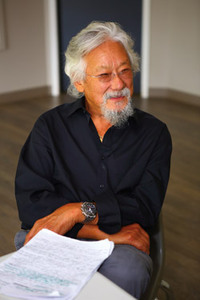
(Credit Ron Pogue)
Canadians go to the polls to elect a new federal government on October 19. We're all faced with an important decision at a critical time in the history of our country and the world. A diverse range of people and organizations around the world are calling on leaders to deal with some serious problems we have created, including climate change and growing inequality. From Pope Francis to the International Monetary Fund to corporate leaders and thinkers to citizens everywhere, recognition is increasing that we can't continue down the same destructive path.
I've seen a lot in my 80 years. After studying in the U.S. for eight years and receiving job offers from several American universities, I returned to Canada in 1962. I was bothered by racism in the U.S., although I found that Canada also shares those problems, especially when it comes to treatment of aboriginal peoples. But I appreciated Canada's health care system and other social programs, as well as equalization payments between provinces, and the CBC and National Film Board. They made Canada different from the U.S. and I preferred it.
Because my Canadian-born parents, and First Nations people, couldn't vote until 1948 and 1960, respectively, I have always regarded the ability to vote as the most precious right in a democracy. But that right is accompanied by a responsibility to be well-informed and to take part in the political process. As a charitable organization, the David Suzuki Foundation can't offer advice on where to place your vote. But we want to encourage everyone to become informed and to question local candidates and leaders about their policies on key issues. Find out which parties have the best and most realistic policies to deal with issues like climate change, pollution, protection of waterways and ecosystems, Indigenous rights and social justice.
As a northern country with the longest marine coastline of any nation, Canada is especially vulnerable to climate change. A growing body of research shows that addressing the problem will also improve the health of citizens and provide numerous benefits to the economy. Failing to act could be costly in many ways, with impacts on human health, agriculture, water resources and the economy. This is where governments need to think beyond the four-year election cycle. Canada needs a national energy strategy and a viable plan to deal with greenhouse
gas emissions.
Regardless of your political leanings, you should encourage your candidates to take these matters seriously. No matter which party forms government after October 19, it's up to us to ensure that it puts the interests of citizens first.
Voters like you will choose the direction the country takes. You can even help shape this election before Election Day by signing up for the David Suzuki Foundation's voter pledge. Please make sure to vote!
By David Suzuki
Hey! Want more DSF? Join David Suzuki on Facebook

How to wash fruits and vegetables

It’s easy to clean fruit and vegetables.
Lots of people touch, sniff and sneeze on produce -- from the farm to the grocery store. So even if you're enjoying organic and local farmers market fruit and veggies, you're bound to encounter dirt and germs (and pesticide residues) from all the caring hands it passes through. But don't buy fancy produce washes. Make your own! It's cheaper and avoids plastic containers.
Tip: Wash produce before eating, not before storing (which will make it rot faster).
Tip: Firm-skinned produce, such as melons and citrus fruits, needs warm water, a scrub and rinse. Soft-skinned produce, such as strawberries or grapes, needs a soak for a few minutes.
Five ways to wash fruits and vegetables
Eco-friendly liquid soap - Choose a simple, unscented, liquid castile soap. Add a squirt to a sink full of water. It's just like washing your hands to remove germs!
Eco-friendly dish soap - Use an unscented, dye-free and antibacterial-free dish soap with water.
Vinegar - Fill a sink with warm water and add plain white vinegar (or apple cider vinegar), one part vinegar to four parts water. Soak, then rinse.
Vegetable glycerin - It's a plant-derived, simple cleanser found at organic grocers or health food stores. Use with water to scrub produce. Rinse.
Soap nuts - Stir a few soap nuts into water to release the natural saponins in their shells. Make the solution as needed. Note: Soap nuts can be used a few times before composting.
By Lindsay Coulter, David Suzuki's Queen of Green
Hey! Want more DSF? Join David Suzuki on Facebook

Solutions for a warming world
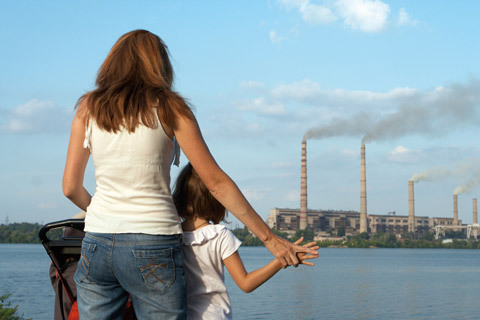
A low carbon future is good for all of us.
The Foundation's climate and clean energy team has been working hard throughout 2015, with all roads leading to Paris for December's UN climate summit. Internationally, the conversation has shifted from whether governments should act to reduce carbon pollution to which can make the most drastic reductions over the shortest timelines.
In particular, subnational governments at state, provincial and municipal levels have made dramatic commitments to move to a low-carbon future. On May 19, leaders from 12 subnational governments (including B.C. and Ontario) spanning seven countries committed to the Under 2 Memorandum of Understanding, promising 80 to 95 per cent reductions in carbon pollution below 1990 levels by 2050 or a level of two metric tonnes per capita. At the international level, G7 countries committed in June to completely phase out carbon pollution for energy by 2100. Even Pope Francis has spoken up, with a recent call to all Catholics and others to reduce emissions and act as stewards of the environment.
With your support, the Foundation also played a leading role in the climate and clean energy conversation in July when subnational governments met in Toronto for the Summit of the Americas and Canada's premiers met in St. John's for the Council of the Federation. By sending delegations to these events to participate in both grassroots-level demonstrations and government-level policy meetings, Foundation staff hope to advocate for unified action to put a price on carbon, phase out coal-powered energy and increase investment in clean technology. We will also focus our public communications on enhancing awareness and understanding about the benefits of a shift to a low-carbon economy for all Canadians in the lead-up to the October federal election and the December Paris UN climate summit.
Hey! Want more DSF? Join David Suzuki on Facebook

David Suzuki's Blog
- David Suzuki's profile
- 247 followers



